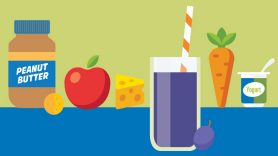How to make a healthy snack your kid will eat
Kids need fuel throughout the day to stay alert and healthy. Nutritious, tasty snacks can help set your kids up for a bright future and reduce their lifetime cancer risk.

When it comes to feeding your kids, the balance between nutrition, convenience and taste can be hard to achieve.
You may nail the first two, but if your child won’t eat what you make, or trades it away for something less healthy, you’ve lost the battle.
Healthy snacks are an important part of your child’s diet, and can help them build good eating habits that will reduce their lifetime risk of cancer.
Why are kids so picky?
The science behind taste, food preferences and picky eating is complicated, says Lindsey Wohlford, a wellness dietitian at MD Anderson. We do know that genes play a role in what foods we like and don’t like. There are also “supertasters” who experience tastes more strongly than the rest of us. That can influence their choices.
We also know that exposure to a variety of foods and tastes while babies are in the womb and through breast-feeding influences their preferences as they grow. Repeated exposure to many foods can change and expand preference in children and adults.
“I counsel parents to offer a variety of foods and not give up after one try,” Wohlford says. “It can take 20 or more tastes before a child develops a preference for a food.”
So, picky eaters may be born that way, but they can also adapt.
Why are healthy snacks important?
Snacks make up a big portion of the total daily calories for kids. Because their tummies are small, they generally can’t eat enough to get all the nutrients they need at mealtime. Snacks also provide energy and help with concentration in school.
But quality and timing are important. It’s important that snacks are nutritious, and that kids – and adults – eat because they are truly hungry.
“Snacking can become a bad habit if we allow kids to consume foods high in sugar and empty calories, or eat according to the clock as opposed to what they’re stomach is telling them,” she says.
What are the basic elements of a healthy snack?
For the most part healthy snacks for kids and adults are the same.
A healthy snack should be made up of whole foods like whole grains, fruits, vegetables, legumes, nuts, seeds, low-fat dairy and lean protein sources.
Aim for less than 200 calories, and choose a carbohydrate combined with a protein or healthy fat.
“I recommend avoiding processed snacks as much as possible, because they are typically high in sugar, fats and sodium, and low in nutrients like fiber and vitamins found in whole foods.”
If you do choose packaged foods, check the label for added sugars and sweeteners, sodium, fat content (especially saturated and trans fats) and dyes and other food additives.
Tips for building a healthy snack
Start slowly. Don’t clean out all their favorite snacks from the pantry in one day. This will only start a power struggle. Begin incorporating things more slowly. Make a rule that they can have one of their chosen snacks each day and the rest of the snacks come from the new healthier snack selections.
Get kids involved. Involving kids in planning, shopping and preparing foods helps them take ownership and interest in it. If they picked it out, they are more likely to eat it. Give them guidelines and let them choose. For example, say “We need a vegetable to dip in our hummus for a snack. What do you think would be good?”
Let them choose. Give them a few healthy choices but allow them to pick their snack.
Keep it where they see it. Keep healthy snacks where kids will see them. Keep fruit on the counter. Fill your fridge with washed and chopped ready-to-eat veggies and fruit. Make sure the pantry has nuts and whole-grain crackers at eye level.
Make it fun. There are a lot of recipes and ideas out there to make snacks fun for kids. Try making faces with foods or the classic ants on a log (peanut butter in the ridge of a celery stick, with raisins along the top.
Be a good role model. If your kids see you eating junk, they learn to eat junk.
“Building healthy snacks for your kids gives them a great foundation to succeed during the day and build healthy habits for a lifetime,” Wohlford say.


